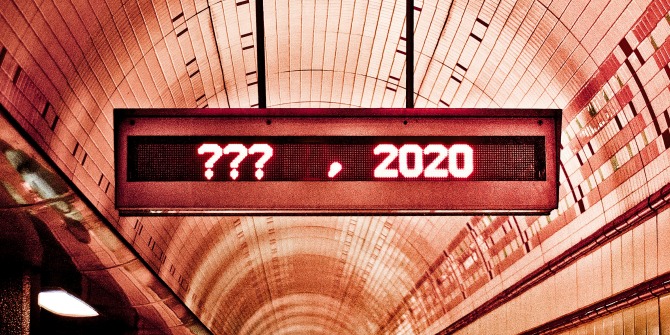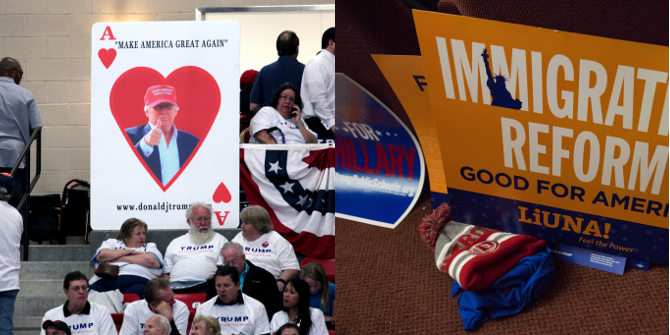 Historically, Republicans – and Republican presidential candidates – have been in favor of trade liberalization. This positive view of free trade has been challenged by Donald Trump’s protectionist ideology, which is aimed at increasing his support among blue-collar workers. Stephanie Rickard writes that even as the GOP is unusually divided over trade, the Democratic camp is united with both Hillary Clinton and Bernie Sanders opposing the Trans-Pacific Partnership deal pushed by President Obama last year.
Historically, Republicans – and Republican presidential candidates – have been in favor of trade liberalization. This positive view of free trade has been challenged by Donald Trump’s protectionist ideology, which is aimed at increasing his support among blue-collar workers. Stephanie Rickard writes that even as the GOP is unusually divided over trade, the Democratic camp is united with both Hillary Clinton and Bernie Sanders opposing the Trans-Pacific Partnership deal pushed by President Obama last year.
International trade has divided Democrats and united Republicans in recent decades. But, in the 2016 primary race, the leading Republican presidential candidates disagree about trade. While Florida Senator Marco Rubio is, in his own words, “very much in favor free trade”, Donald Trump avidly opposes trade agreements. Trump called NAFTA “a disaster” and the Trans-Pacific Partnership (TPP) a “terrible deal”.
The issue of free trade illuminates the mounting divisions in the Republican party. The party’s free-trade, free-market establishment remains committed to trade liberalization but the activist base has grown more protectionist during the economic downturn. Trump comes down on the side of the protectionists – appealing to voters who feel excluded from the economic recovery.
While Republicans are divided over trade, the Democratic candidates are united in their opposition to the TPP – one of the biggest trade deals in decades with twelve signatory countries covering nearly 40 percent of global GDP. Vermont Senator Bernie Sanders’ opposition to trade is stronger and more credible than Clinton’s. Sanders has long opposed TPP and promised to “reverse” NAFTA if elected president. In 2005, Sanders spearheaded a congressional effort to reverse permanent normal trade relations (PNTR) with China, a designation that prevents the US from imposing special tariffs on China that it doesn’t impose on other trading partners. Given his record, Sanders is arguably the most anti-trade candidate in the race.
Hillary Clinton’s position on trade is somewhat more ambiguous. Clinton supported TPP while she was Secretary of State. But now as a presidential candidate, she opposes it, a change of heart which may be a reaction to Sanders’ staunch opposition to free trade. On this issue at least Sanders seems to have successfully pushed Clinton to the left. Her flip-flop on TPP may also be an attempt to appeal to labor unions, which are united against TPP.
Like Trump, Clinton raises concerns about “currency manipulation” and criticizes the TPP agreement for ignoring this issue. Here, at least, a Clinton-Trump match up would offer little room for debate. However, Trump may attack Clinton for her earlier support for TPP. Ironically, in the 2016 election, it may be the Republican that takes a strongly protectionist stance while the Democrat defends free trade.
Featured image credit: peoplesworld (Flickr, CC-BY-NC-2.0)
Please read our comments policy before commenting.
Note: This article gives the views of the author, and not the position of USAPP – American Politics and Policy, nor the London School of Economics.
Shortened URL for this post: http://bit.ly/1Y5rdOs
_________________________________
 Stephanie Rickard – LSE Government
Stephanie Rickard – LSE Government
Stephanie Rickard is an Associate Professor of Political Science at the LSE’s Government Department. Her research examines the effects of political institutions on economic policies.







Trump is an opportunist, he has no positions — any he has now will evaporate. If he were to be elected he’d then abandon them, as other opportunities came along.
Sanders seems sincere. His views on trade, though, are taken from the 1930’s, and earlier in the last two century’s labor struggles, like most of his other opinions. Youth voters cuurently enamored of Bernie need to read that history: most of what he advocates has been rejected before — or tried, with mixed results — we’ve been there, but new things are happening now.
Trade is “war by peaceful means”, famously — its alternative is isolationism, alienation, & eventually war, every time. Trade pacts are our chief tool for preventing international conflict. Bernie is wrong about this… and Trump just plain doesn’t care…